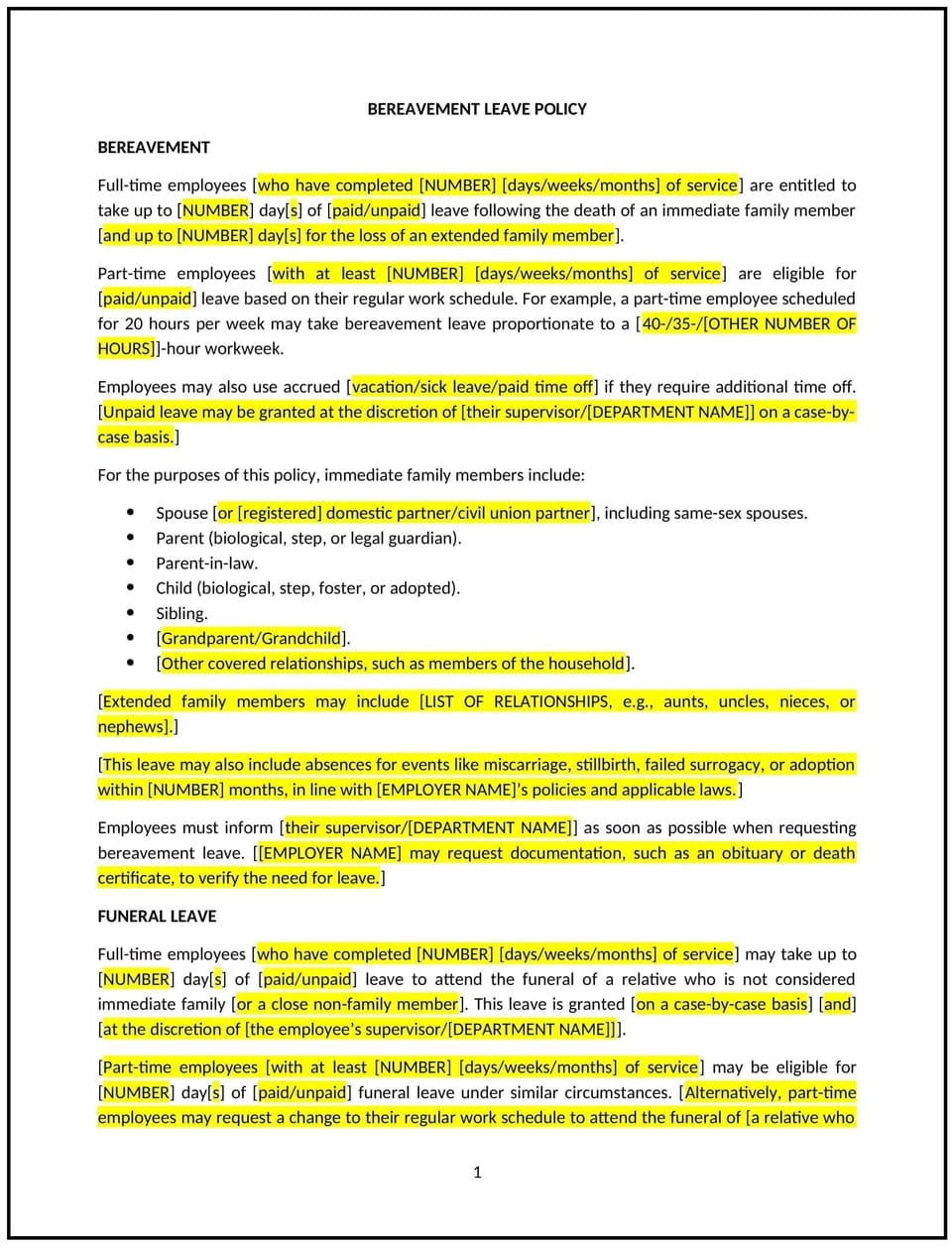Bereavement leave policy (Kansas): Free template

Bereavement leave policy (Kansas)
A bereavement leave policy helps Kansas businesses provide employees with time off following the loss of a loved one. This policy outlines the amount of leave available, eligibility criteria, and the process for requesting time off while balancing employee well-being and business operations.
By implementing this policy, businesses can support employees during difficult times, promote a compassionate workplace culture, and provide clear guidelines for handling bereavement-related absences.
How to use this bereavement leave policy (Kansas)
- Define leave eligibility: Businesses should specify which employees qualify for bereavement leave and what relationships qualify, such as immediate family members, extended family, or household members.
- Outline leave duration: Businesses should establish the amount of time off provided, distinguishing between paid and unpaid leave if applicable.
- Set request procedures: Employees should be informed about how to request bereavement leave, including whom to notify and whether documentation, such as an obituary or funeral notice, is required.
- Address additional leave needs: Businesses should clarify whether employees can use personal leave, vacation days, or unpaid time off for extended absences related to bereavement.
- Communicate return-to-work expectations: Businesses should establish expectations for when employees should return to work and how to request accommodations if additional time is needed.
- Provide emotional support options: Businesses should consider offering resources such as employee assistance programs (EAPs) or counseling services.
- Review and update regularly: Businesses should periodically assess the policy to reflect workplace needs and evolving best practices.
Benefits of using a bereavement leave policy (Kansas)
- Supports employee well-being: Gives employees time to grieve without added workplace stress.
- Promotes workplace compassion: Demonstrates a business’s commitment to supporting employees during personal hardships.
- Reduces absenteeism issues: Establishes a structured process for requesting bereavement leave, preventing confusion and scheduling disruptions.
- Provides clarity and fairness: Ensures all employees understand their leave options and receive fair treatment.
- Encourages open communication: Helps employees feel comfortable discussing bereavement leave needs with management.
- Enhances employee retention: A compassionate approach to bereavement leave can strengthen employee loyalty and workplace morale.
Tips for using this bereavement leave policy (Kansas)
- Communicate the policy clearly: Businesses should ensure employees understand bereavement leave eligibility, request procedures, and available support.
- Allow flexibility when possible: Businesses should accommodate reasonable leave requests to support grieving employees.
- Handle requests with sensitivity: Managers and HR representatives should approach bereavement leave discussions with care and discretion.
- Offer additional resources: Providing access to grief support programs can help employees navigate their loss.
- Track leave usage consistently: Businesses should monitor bereavement leave while respecting employees’ privacy.
- Review policy effectiveness: Businesses should gather employee feedback periodically to assess whether the policy meets workforce needs.
Q: Why should Kansas businesses implement a bereavement leave policy?
A: Businesses should implement a bereavement leave policy to support employees during times of loss, provide structured leave guidelines, and promote a compassionate workplace culture.
Q: How much bereavement leave should businesses offer?
A: Businesses should determine leave duration based on operational needs and industry standards. Some businesses offer three to five days for immediate family members and additional options for extended leave.
Q: What relationships should businesses include in bereavement leave eligibility?
A: Businesses should define which relationships qualify, typically including immediate family members such as spouses, parents, children, and siblings. Some policies may extend eligibility to grandparents, in-laws, or household members.
Q: Can employees take additional time off beyond bereavement leave?
A: Businesses should allow employees to use personal leave, vacation days, or unpaid leave if they require more time. Providing flexibility helps employees manage their grief effectively.
Q: Should businesses require documentation for bereavement leave?
A: Businesses may request documentation, such as an obituary or funeral notice, but should approach requests with sensitivity and discretion.
Q: How should businesses support employees returning from bereavement leave?
A: Businesses should check in with returning employees, offer workplace accommodations if needed, and ensure a supportive transition back to work.
Q: How often should businesses review and update their bereavement leave policy?
A: Businesses should review the policy annually or whenever workplace needs change. Periodic updates ensure the policy remains relevant and effective.
This article contains general legal information and does not contain legal advice. Cobrief is not a law firm or a substitute for an attorney or law firm. The law is complex and changes often. For legal advice, please ask a lawyer.


